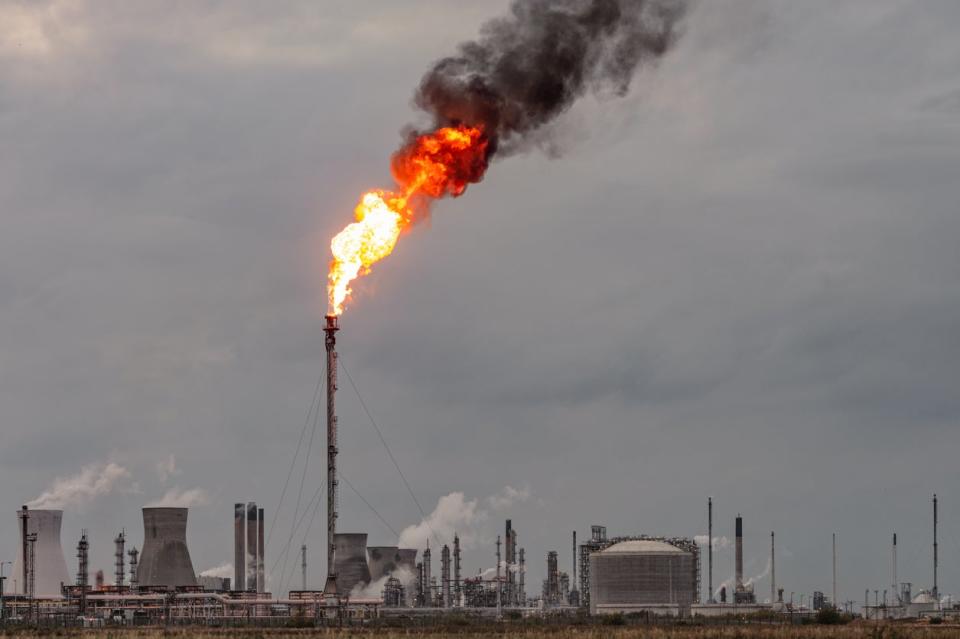Our government has an unhealthy fossil fuel addiction

Smoke rising from an oil refinery and petrochemical plant in Scotland
(Getty/iStock)This year the UK will host global climate talks in Glasgow, and the whole world will be looking to us for climate leadership. Yet we find ourselves in a uniquely strange predicament because our government, while parading ambitious targets, is still obsessed with fossil fuels.
Last month, the government announced its long-awaited North Sea Transition Deal. This was an opportunity to unveil the UK’s clean energy vision. The deal could have mapped out a route away from fossil fuels and encourage private investment in our renewables economy. It was a chance to ensure that workers and communities in Scotland and the northeast of England benefit from the transition with secure and sustainable employment opportunities.
Instead, the government decided it will carry on allowing industry to seek out new sources of oil and gas that could lock in our reliance on fossil fuels for the next 30 years. The government says this is fine though, because companies will now have to pass a so-called “climate compatibility” check, to show how their extraction of more fossil fuels is aligned with our goals to tackle the climate emergency.
Unsurprisingly, the government hasn’t quite worked out yet what these climate compatibility checks will look like. The details of this magic trick will all be revealed later this year. But this looks suspiciously like the government kicking the issue into the long grass until after the global climate talks have finished. Boris Johnson is missing a crucial opportunity to show real climate leadership by steering our energy industry away from fossil fuels to renewables now.
This fixation with oil and gas is looking increasingly old-fashioned. Denmark, France and Ireland have all announced plans to stop dishing out new oil and gas licences. In the US, President Biden has issued an executive order to suspend new oil and gas leases on federal lands and waters. And even parts of the oil industry are in agreement that we’ve reached peak oil demand, with BP reportedly confirming it will leave 40 per cent of its own oil reserves in the ground.
Worse still, the government’s oil and gas addiction doesn’t come cheap. Thanks to hugely generous subsidies, the oil and gas industry costs the UK more money than it brings in. For example, Shell reportedly paid the Norwegian government almost $1.8bn (£1.3bn) in taxes in 2019, but in the UK, it received a rebate of almost $100m (£72m).
For workers and communities in the North Sea, the government’s transition deal glaringly lacks a key element – transition. We know that last year, in a survey by Greenpeace, Friends of the Earth Scotland and Platform, 43 per cent of offshore workers said they were made redundant or furloughed in the first six months of the pandemic. And four in five workers surveyed said they’d consider moving to another industry. The most important thing to workers surveyed was job security.
Despite politicians’ claim to “level up” the country, whole regions of Scotland and the northeast of England are not being supported to move away from a declining industry, while increasingly poor job security and working conditions in the oil and gas and industry remain unaddressed. Instead of propping up the fossil fuel industry’s profit margins, the government should focus investment on job creation in future energy. And workers who have powered our energy sector must be given proper support to transfer their offshore qualifications from oil to renewables.
So what is the government’s big plan for the North Sea? A lot of it is hot air – as in literally, gas. A fossil fuel that causes carbon emissions when burned. And the rest of it is carbon capture and storage – something that doesn’t yet exist at scale and isn’t zero carbon.
The government talks a lot about climate ambition, but it seems to have missed the memo that the cause of the climate crisis is ever-increasing carbon emissions from fossil fuels. The simplest thing to do would be to pump out less carbon by switching to clean energy, and to use that energy more efficiently. But instead of getting on with it – revamping our homes, upgrading public transport, and ending new licences for oil and gas – the government is hell-bent on burying its head (and some of its carbon emissions) in the sand.
John Sauven is Greenpeace UK executive director
Read More
Brazil's Bolsonaro points finger at developed nations for historic fossil-fuel burning
The world has to keep fossil fuels in the ground – we owe it to both current and future generations

 Yahoo Finance
Yahoo Finance 